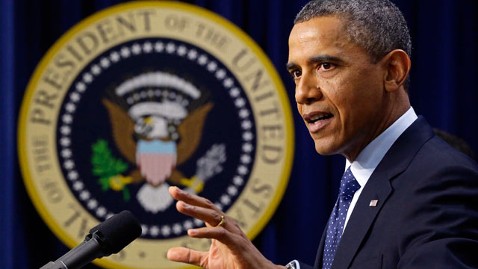Minutes after the House of Representatives approved a bipartisan Senate deal to avert the "fiscal cliff" and preserve Bush-era tax cuts for all Americans making less than $400,000 per year, President Obama praised party leaders and wasted little time turning to the next fiscal fight.
"This is one step in the broader effort to strengthen our economy for everybody," Obama said.
Obama lamented that earlier attempts at a much larger fiscal deal that would have cut spending and dealt with entitlement reforms failed. He said he hoped future debates would be done with "a little less drama, a little less brinksmanship, and not scare folks quite as much."
But Obama drew a line in the sand on the debt ceiling, which is set to be reached by March.
"While I will negotiate over many things, I will not have another debate with this Congress over whether they should pay the bills for what they've racked up," Obama said. "We can't not pay bills that we've already incurred."
An hour after his remarks, Obama boarded Air Force One to return to his planned Hawaiian holiday vacation, reuniting with his family, who have been vacationing there since just before Christmas.
AP Photo/Charles Dharapak
'Fiscal Cliff' Negotiations: Congress Reaches Agreement Watch Video
House Republicans agreed to the up-or-down vote Tuesday evening, despite earlier talk of trying to amend the Senate bill with more spending cuts before taking a vote. The bill delays for two months tough decisions about automatic spending cuts that were set to kick in Wednesday.
A majority of the Republicans in the GOP-majority House voted against the fiscal cliff deal. About twice as many Democrats voted in favor of the deal compared to Republicans. One hundred fifty-one Republicans joined 16 Democrats to vote against the deal, while 172 Democrats carried the vote along with 85 Republicans.
The Senate passed the same bill by an 89-8 vote in the wee hours of New Year's Day. If House Republicans had tweaked the legislation, there would have been no clear path for its return to the Senate before a new Congress is sworn in Thursday.
The vote split Republican leaders in the House. House Speaker John Boehner, R-Ohio, voted yes, and so did the GOP's 2012 vice presidential candidate, Rep. Paul Ryan, R-Wis.
But House Majority Leader Eric Cantor, R-Va., the No. 2 Republican in the House, voted no. It was his opposition that had made passage of the bill seem unlikely earlier in the day.
The deal does little to address the nation's long-term debt woes and does not entirely solve the problem of the "fiscal cliff."
Indeed, the last-minute compromise -- far short from a so-called grand bargain on deficit reduction -- sets up a new showdown on the same spending cuts in two months amplified by a brewing fight on how to raise the debt ceiling beyond $16.4 trillion. That new fiscal battle has the potential to eclipse the "fiscal cliff" in short order.
"Now the focus turns to spending," said Boehner in a statement after the vote. "The American people re-elected a Republican majority in the House, and we will use it in 2013 to hold the president accountable for the 'balanced' approach he promised, meaning significant spending cuts and reforms to the entitlement programs that are driving our country deeper and deeper into debt."
Republicans hope that allowing the fiscal cliff compromise, which raised taxes without an equal amount of spending cuts, will settle the issue of tax rates for the coming debates on spending.



















